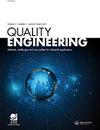通过主动热成像和集成技术改进了对亚表面缺陷的检测
IF 1.3
4区 工程技术
Q4 ENGINEERING, INDUSTRIAL
引用次数: 0
摘要
质量控制和缺陷检测是工业环境中的主要挑战。这些缺陷的定位是至关重要的,因为它们会影响制成品的性能,甚至是人的安全。基于视觉传感器和图像处理的缺陷检测方法是目前最常用的方法。为了检测亚表面缺陷,通常将主动热成像和深度学习相结合。本文采用主成分热成像技术(PCT, Principal Components Thermography)提高了信噪比(SNR,信噪比),结果有了明显改善。该领域的最新发展将深度学习模型应用于语义分割和目标检测。然而,预测的质量不足以确保满足所有的质量控制。本文提出了语义分割和目标检测相结合的方法来提高预测的可靠性。为了实现这种组合,提出了一种工作方法和两种新的集成策略。在使用碳纤维片的真实工业场景中,将所提出的组合与仅使用语义分割方法的结果进行比较后,发现该建议将分割指标提高了5%至24%。从而提高了预测的可靠性。本文章由计算机程序翻译,如有差异,请以英文原文为准。
Improved detection of subsurface defects through active thermography and ensembling techniques
Abstract Quality control and defect detection are major challenges in industrial environments. The localization of these defects is of crucial importance, as they can affect the performance of manufactured products and even the safety of people. Defect detection methods based on visual sensors and image processing are nowadays the most common approaches. To detect subsurface defects it is common to combine active thermography and deep learning. In this paper, PCT (Principal Components Thermography) is employed to enhance the SNR (signal-to-noise ratio), leading to a significant improvement in the results. Recent developments in this field apply deep learning models for semantic segmentation and object detection. However, the quality of the predictions is not enough to ensure that all quality controls are met. In this paper, a combination of semantic segmentation and object detection is proposed to increase the reliability of predictions. To carry out this combination, a working methodology and two new ensembling strategies are proposed. After comparing the results of the proposed combination with the results of using only semantic segmentation methods in a real industrial scenario, where carbon fiber sheets are used, it is found that the proposal improves the segmentation metrics by a 5% to a 24%. Thus the reliability of the predictions is improved.
求助全文
通过发布文献求助,成功后即可免费获取论文全文。
去求助
来源期刊

Quality Engineering
ENGINEERING, INDUSTRIAL-STATISTICS & PROBABILITY
CiteScore
3.90
自引率
10.00%
发文量
52
审稿时长
>12 weeks
期刊介绍:
Quality Engineering aims to promote a rich exchange among the quality engineering community by publishing papers that describe new engineering methods ready for immediate industrial application or examples of techniques uniquely employed.
You are invited to submit manuscripts and application experiences that explore:
Experimental engineering design and analysis
Measurement system analysis in engineering
Engineering process modelling
Product and process optimization in engineering
Quality control and process monitoring in engineering
Engineering regression
Reliability in engineering
Response surface methodology in engineering
Robust engineering parameter design
Six Sigma method enhancement in engineering
Statistical engineering
Engineering test and evaluation techniques.
 求助内容:
求助内容: 应助结果提醒方式:
应助结果提醒方式:


